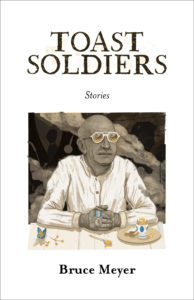by Sharon Berg
Toast Soldiers
by Bruce Meyers
Crowsnest Books (2021)
Bruce Meyers is a prolific, award-winning writer. Every story in Toast Soldiers is both insightful and serious, with protagonists who attempt to put their best foot forward. There are 25 stories and most of them deal with some sort of trauma. The thing that gave me the most pause while reading was the worldview of many of the characters, who are tried by sometimes disastrous events in their lives. For example, the title story, Toast Soldiers, deals with holding onto a desire for vengeance in the killing of a friend.
We find several war pals long after WWII, in a nursing home. Opponents from the war finally meet when (British) Keith has just lost his second confidant, another resident. His place at the 4-spot table is taken up by a new resident, (German) Kepler. A long held British vs. German feud continues with a trivial incident, the removal of Keith’s marmalade from the table, by Kepler. Keith addresses their WWII connection through Keith’s loss of his best friend when a German girl shot him. He responded by killing her and continues to carry a grudge against all Germans thereafter. It’s suggested, but not proven, that Kepler and a quiet elderly woman sitting at the table the marmalade was moved to, manage to poison Keith. Their vengeance speaks to their own loss of the girl Keith killed in WWII. In the end, the story leaves one feeling that love is sustaining, but it is also debilitating when vengeance seems unavoidable.
Victor Frankel survived the camps during the Holocaust, becoming a post-War author, a neurologist, psychiatrist, and philosopher. He’s famous for claiming that human beings can endure almost any test if they can find meaning in it. His philosophy strikes a sharp contrast to the message of the opening story. I tend to believe Victor Frankel, which is why that story and some others in Toast Soldiers leave me feeling remarkably dissatisfied.
I cannot quarrel with either the writing style or the development of the characters in these stories. All are well done. Rather, it is the impetus for collecting all of these stories in one book that puts me off. Toast Soldiers is permeated with a sadness that is difficult to lift, though there are a few places where the message is positive. In Oglivie, for instance, a disgruntled and brain-damaged man who was a Boxer visits a bakery and discovers a moment of success in returning to his old home town. However, The Promised Land presents a group of confused children who grow up during the Cold War, surrounded by a barrage of messages they need to understand in order to see how nuclear threats apply to them:
“Peace and violence were woven into the tangled tapestry of a life everyone told them they were lucky to live. Peace and violence were the reasons there was a bomb. The bomb kept the peace. No one ever dreamed it would be dropped on them, and violence was so innocent, so kind that it only happened to cartoon characters, though the cat that belonged to the boy down the street was the exception none of the other kids wanted to talk about.”
While they’re at school, there is a bomb scare that has their teachers crying. Two brothers and their sister run home to find their mother has gone to the hospital to have another baby. Toby and his young brother decide to go out to ride on their bicycles because, as Toby says, “Let’s go out and enjoy the world while we still have it.”
There’s no denying the art in Bruce Meyers’ writing. His language is direct and appealing. Yet, this is a dark book. While Toast Soldiers carries several positive notes, every story touches on doom-and-gloom. The result? Toast Soldiers presents a pessimistic optimism. It makes me think of Christmas stories told while a Halloween organ plays in the background. In the end – for this reader at least – the sugar plums and fairies can’t compete with the negativity spawned by the bad decisions and corruption experienced by so many of the characters in these tales.
Sharon Berg writes poetry, fiction, nonfiction, book reviews, and articles. She has published poems in periodicals across the world, as well as several books of poetry, chapbooks, and short fiction collections.
